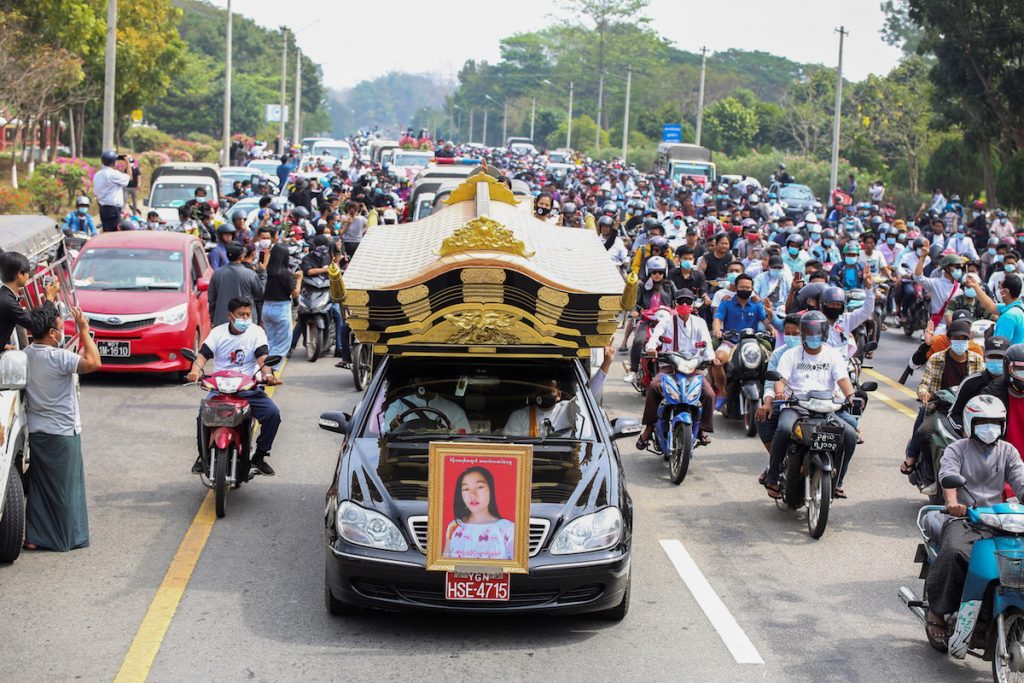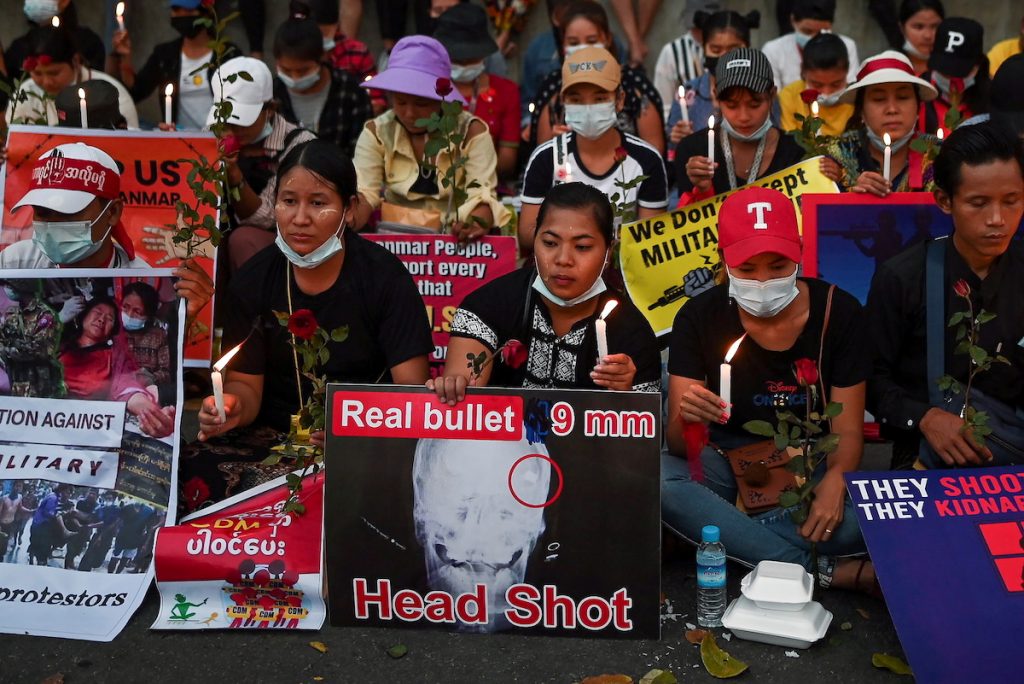Myanmar police began to disperse protesters in the capital, Naypyitaw, on Feb. 22 as businesses around the country shut in a general strike called to oppose the military coup despite a threat from authorities that confrontation could cost lives.
Three weeks after seizing power, the junta has failed to stop daily protests and a civil disobedience movement calling for the reversal of the Feb. 1 coup and release of elected leader Aung San Suu Kyi.
There were protests in cities and towns across the country on Feb. 22, from the northern hills on the border with China to the central plains, the Irrawaddy River delta and the southern panhandle.
Images posted on social media showed a police water cannon truck and numerous other vehicles closing in to break up a procession of chanting people in Naypyitaw, where the military is headquartered. As the protesters scattered, police on foot chased them, wrestling several to the ground.
“They’re chasing and arresting us. We’re just protesting peacefully,” one woman said in video clip posted on Facebook.
Three protesters have been killed since the protest campaign began — two shot dead in Mandalay on Feb. 20, and a funeral for the first, a young woman, drew hundreds of people in Naypyitaw on Feb. 21.
Security forces were deployed in large numbers in the main city of Yangon where many thousands of protesters congregated.

“Everyone is joining this,” said San San Maw, 46, at the Hledan junction in the main city of Yangon, which has become a rallying point for the protests. “We need to come out.”
In a country where dates are seen as auspicious, protesters noted the significance of the date 22.2.2021, comparing it with demonstrations on Aug. 8, 1988 when a previous generation staged anti-military protests which were bloodily suppressed.
The response of security forces this time has been less deadly. While at least three protesters have now been killed, the army has said one policeman died of injuries in protests.
The deaths in Mandalay did not discourage protesters on Feb. 21, when they turned out again in tens of thousands there and in Yangon and elsewhere.
State-owned media MRTV warned protesters against action on Feb. 22.
“Protesters are now inciting the people, especially emotional teenagers and youths, to a confrontation path where they will suffer the loss of life,” it said.
Htet Htet Hlaing, 22, said she was scared and had prayed before joining Feb. 22’s demonstration, but would not be discouraged.
“We don’t want the junta, we want democracy. We want to create our own future,” she said.
Author and historian Thant Myint-U said the window for a peaceful resolution was closing.
“The outcome of the coming weeks will be determined by just two things: the will of an army that’s crushed many protests before and the courage, skill and determination of the protesters (much of society),” he said on Twitter.
‘Restraint’
As well as local stores, international chains announced closures on Feb. 22, including Yum Brands Inc.’s KFC and delivery service Food Panda, owned by Delivery Hero. Southeast Asian company Grab stopped delivery services too, but left its taxis running.
Authorities were “exercising utmost restraint”, the foreign ministry said in a statement. It rebuked some countries for remarks it described as flagrant interference in Myanmar’s internal affairs.
Several Western countries have condemned the coup and decried the violence against protesters.

US Secretary of State Antony Blinken said on Twitter the United States would continue to “take firm action” against authorities violently cracking down on opponents of the coup in the Southeast Asian country that is also known as Burma.
“We stand with the people of Burma,” he said.
Britain, Germany, Japan and Singapore have also condemned the violence and UN Secretary-General Antonio Guterres said lethal force was unacceptable.
UN special rapporteur on human rights to Myanmar, Tom Andrews, said he was deeply concerned by the junta’s warning to protesters.
“Unlike 1988, actions by security forces are being recorded and you will be held accountable,” he said on Twitter.
The army seized power after alleging fraud in Nov. 8 elections that were swept by Suu Kyi’s National League for Democracy (NLD), detaining her and much of the party leadership. The electoral commission dismissed the fraud complaints.
Myanmar’s Assistance Association for Political Prisoners said 640 people have been arrested, charged or sentenced since the coup — including former members of government and opponents of the army takeover.





